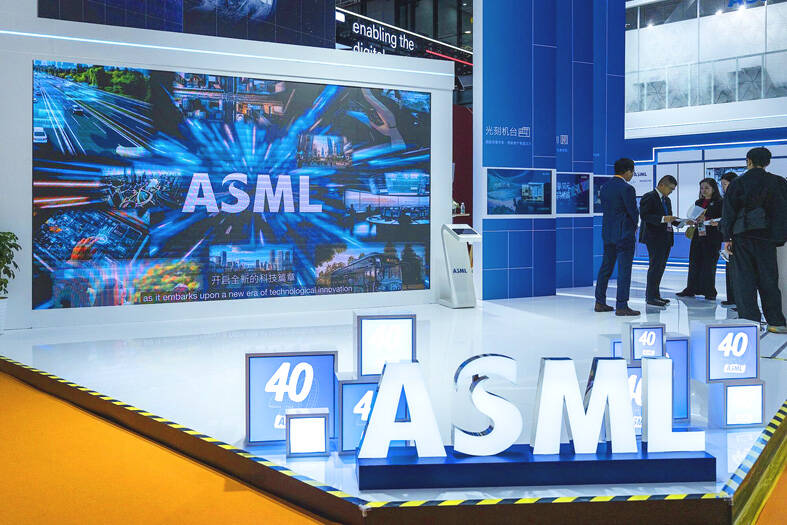A former ASML Holding NV employee is facing a lawsuit in the Netherlands over suspected theft of trade secrets, Dutch public broadcaster NOS said, in the latest breach of the maker of advanced chip-manufacturing equipment.
The 43-year-old Russian engineer, who is suspected of stealing documents such as microchip manuals from ASML, is expected to appear at a court in Rotterdam today, NOS reported on Friday.
He is accused of multiple violations of the sanctions legislation and has been given a 20-year entry ban by the Dutch government, the report said.

Photo: Bloomberg
The Dutch company makes machines needed to produce high-end chips that power everything from electric vehicles to military gear, and it has benefited from a surge in artificial intelligence spending.
It has also been the target of earlier data breaches.
ASML accused a former Chinese employee of stealing chip data last year.
The former worker took data from a software system that the corporation uses to store technical information about its machinery. The employee then went on to work for China’s Huawei Technologies Co (華為).
ASML has previously accused Dongfang Jingyuan Electron Ltd (東方晶源微電子科技) of obtaining its technology and transferring it to China.
One engineer was accused of stealing all 2 million lines of source code for critical ASML software and then sharing part of it with employees at Dongfang and a related company in the US, according to transcripts of the proceedings.
The accused Russian engineer worked for Dutch firm Mapper Lithography BV, which was declared bankrupt in 2018.
ASML agreed to acquire the company’s assets and its employees in 2019.
“We are aware of the lawsuit against a former Mapper and ASML employee,” ASML’s spokesperson Monique Mols said.
“In accordance with our policy, we have also filed a report ourselves. We will not comment further during the lawsuit,” she said.

Anna Bhobho, a 31-year-old housewife from rural Zimbabwe, was once a silent observer in her home, excluded from financial and family decisionmaking in the deeply patriarchal society. Today, she is a driver of change in her village, thanks to an electric tricycle she owns. In many parts of rural sub-Saharan Africa, women have long been excluded from mainstream economic activities such as operating public transportation. However, three-wheelers powered by green energy are reversing that trend, offering financial opportunities and a newfound sense of importance. “My husband now looks up to me to take care of a large chunk of expenses,

SECTOR LEADER: TSMC can increase capacity by as much as 20 percent or more in the advanced node part of the foundry market by 2030, an analyst said Taiwan Semiconductor Manufacturing Co (TSMC, 台積電) is expected to lead its peers in the advanced 2-nanometer process technology, despite competition from Samsung Electronics Co and Intel Corp, TrendForce Corp analyst Joanne Chiao (喬安) said. TSMC’s sophisticated products and its large production scale are expected to allow the company to continue dominating the global 2-nanometer process market this year, Chiao said. The world’s largest contract chipmaker is scheduled to begin mass production of chips made on the 2-nanometer process in its Hsinchu fab in the second half of this year. It would also hold a ceremony on Monday next week to

TECH CLUSTER: The US company’s new office is in the Shalun Smart Green Energy Science City, a new AI industry base and cybersecurity hub in southern Taiwan US chip designer Advanced Micro Devices Inc (AMD) yesterday launched an office in Tainan’s Gueiren District (歸仁), marking a significant milestone in the development of southern Taiwan’s artificial intelligence (AI) industry, the Tainan City Government said in a statement. AMD Taiwan general manager Vincent Chern (陳民皓) presided over the opening ceremony for the company’s new office at the Shalun Smart Green Energy Science City (沙崙智慧綠能科學城), a new AI industry base and cybersecurity hub in southern Taiwan. Facilities in the new office include an information processing center, and a research and development (R&D) center, the Tainan Economic Development Bureau said. The Ministry

State-run CPC Corp, Taiwan (CPC, 台灣中油) yesterday signed a letter of intent with Alaska Gasline Development Corp (AGDC), expressing an interest to buy liquefied natural gas (LNG) and invest in the latter’s Alaska LNG project, the Ministry of Economic Affairs said in a statement. Under the agreement, CPC is to participate in the project’s upstream gas investment to secure stable energy resources for Taiwan, the ministry said. The Alaska LNG project is jointly promoted by AGDC and major developer Glenfarne Group LLC, as Alaska plans to export up to 20 million tonnes of LNG annually from 2031. It involves constructing an 1,290km